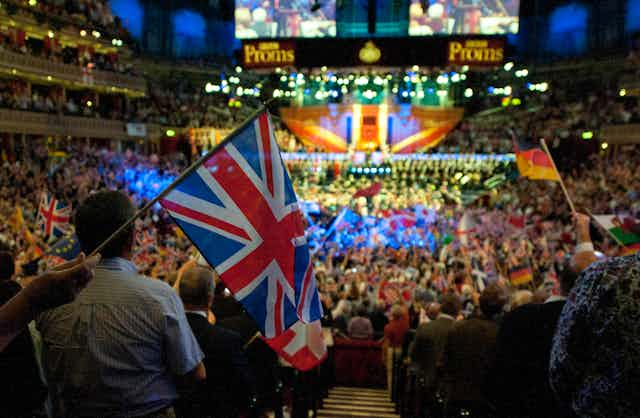Turn your memories back to the opening ceremony of the London Olympics in July 2012 and the entrance of the British team into the stadium. The jubilant, flag-waving athletes marched around the arena of cheering spectators to the sound of David Bowie’s Heroes – for many people the perfect anthem to reflect a modern expression of national aspiration and pride.
The suitability, or otherwise, of various of the songs traditionally chosen in the UK to express patriotic feelings is currently the subject of fierce debate as the last night of the annual series of Proms concerts staged by the BBC draws near.
It won’t be a traditional Last Night of the Proms this year. Instead, in light of the COVID-19 pandemic and the continuing need for social distancing measures, the concerts are being held without audiences and restricted numbers of musicians. This, of course, makes it impossible to feature what many regard as the high point of the season – the gathering of flag-waving “promenaders” lustily singing the traditional patriotic anthems Land of Hope and Glory and Rule Britannia.
Meanwhile, the recent Black Lives Matter protests and the campaigns to remove statues linked with Britain’s slave-owning past have prompted a national debate about the way the UK represents its imperial heritage.
Read more: Why the UK needs its own Black Lives Matter moment to wake up to police racism
The most recent manifestation of these culture wars is regarding the BBC’s decision that instrumental rather than vocal-led arrangements of Land of Hope and Glory and Rule Britannia should be performed at this year’s Last Night Of The Proms.
On the one hand are those who would portray this as kow-towing to a “Maoist” cultural revolution led by a youthful vanguard of “woke” activists intent on tearing down the pillars of traditional British culture. On the other are those who believe that the realities of contemporary society would be better reflected by letting go of the trappings of Britain’s exploitative colonial past: including these two patriotic songs.
So what is it about the words to these two songs that critics find problematic? The line “mother of the free” in Land of Hope and Glory is likely to ring alarm bells with those who regard British colonial domination as providing anything but freedom. Rule Britannia’s confident assertion that “Britons never, never, never shall be slaves” similarly provides fodder for its critics.
Are the British being oversensitive to these historic lyrical artefacts? The Germans have actively reshaped their national anthem Das Lied der Deutsche by dropping the first two verses that celebrate German superiority for the more politically acceptable third that extols “Unity and justice and freedom”.
In recent years the nationalistic element of the Last Night Of The Proms has been somewhat subverted with many of the attendees waving the European flag rather than the traditional Union Flag. And, for many of the audience in recent years, the patriotic fervour of the Last Night of the Proms has been more ironic than passionate.
But this year in response to the proposed changes, a petition in favour of the status quo has reached more than 10.000 signatories in 24 hours. The BBC has also had to defend principal guest conductor from Finland, Dalia Stasevska, from what it has called “unjustified personal attacks” on social media.
In an attempt at modernisation this year’s concert will include the Liverpool anthem You’ll Never Walk Alone, along with more traditional elements such as Hubert Parry’s Jerusalem – albeit in a new arrangement by British composer Errollyn Wallen. The national anthem will also be played as usual. But this is clearly not enough to appease the sector of the audience for whom the Land of Hope and Glory and Rule Britannia singalong is sacrosanct.
So what songs would be acceptable as we move forward? There are certainly some strong traditional contenders such as I Vow to Thee My Country with its focus on “gentleness” and peaceful paths, or the more overtly religious Abide With Me. But would those songs from what many might regard as a distant past reflect the contemporary national identity?
It might be that that the popular music canon, with a better – if still imperfect – track record on social justice, might provide a fruitful resource. The Beatles’ All You Need Is Love could prove to be unifying and uncontroversial, with plenty of scope for grand orchestral flourishes.
One initial problem is that it’s not straightforward to find songs that represent the whole of the UK. For instance, the perennial Proms favourite, Jerusalem, has long been widely regarded as being solely about England.
There are songs based on UK locations such as Kate Bush’s “Wuthering Heights” which have already inspired participatory “flash-mob”-style events with hundreds donning red dresses and copying her choreography. It would be a joy to watch the promenaders – who are surely the proto-flashmobbers – belting out “Heathcliff, It’s me, I’m Cathy, I’ve come home” while recreating the pop star’s expressive dance routine in perfect synchronisation.
An evocative and wonderfully orchestrated medley of river-related songs might be a more genteel way to unite the country. Consider The Song of the Clyde, Fog on the Tyne by Lindisfarne, Ferry Cross the Mersey by Gerry and the Pacemakers, Waterloo Sunset by The Kinks and Jimmy Cliff’s beautifully plangent Many Rivers To Cross, which offers a take on the immigrant experience as a tribute to the Windrush generation.
The BBC has an almost impossible task in trying to please both the traditionalists and the reformers – and it may be that its graduated approach has some merits. But culture always moves on and pillars that seemed secure can be swiftly abandoned as relics of a previous and discredited era when change comes swiftly as it is surely doing now.
In light of recent political events the Sex Pistol’s punk anthem Anarchy in the UK might be seen as both more apposite and unifying by those of an uncharitable and less devolved mindset.

